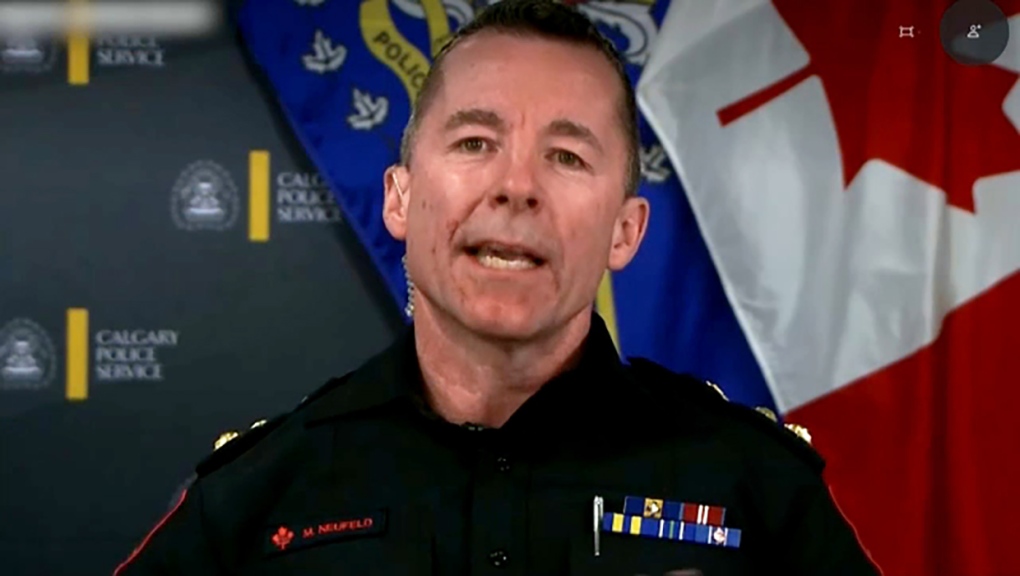'Not ready': Alberta police association says it won't support drug decriminalization
As others in Canada start to take steps towards new personal possession rules, Alberta's police association says it's too soon to decriminalize hard drugs in our province.
Calgary's top cop Mark Neufeld, speaking on behalf of the Alberta Association of Chiefs of Police, says there's not enough evidence that shows the strategy alone will have an impact.
"By itself, decriminalization would not reduced rates of addiction or overdose," he said. "(It) triggers an immediate need for structural and societal changes in areas that do not currently exist."
The association says there is still work in health, social services and justice that needs to be done before rules can be overhauled. It believes premature changes will result in complaints and open public drug use that will lead to more work for officers.
"If you were to just pull sort of one lever, and it was going to be the decriminalization lever, all it would do is just make it easier to possess illicit drugs and also to see individuals using them in public," Neufeld said. "We're not ready."
 Calgary police chief Mark Neufeld says the city isn't ready to decriminalize drugs
Calgary police chief Mark Neufeld says the city isn't ready to decriminalize drugs
OPEN DRUG USE HAPPENING NOW: ADVOCATES
But while the chief is trying to save his officers added duties, many advocates point out that policing work is already embedded in drug use effects -- and decriminalization would be a step to remedying that.
Across the country in 2018 to 2020, almost 28,000 annual arrests were made for possession.
"We're making people's lives very miserable if they use drugs," advocate Euan Thomson told CTV News. "With a new strategy, drug use will likely go down, people will gain stability in their lives and as their human rights are restored, and our communities will actually become safer."
Thomson points to Portugal, where decades-old decriminalization can be directly linked to a decrease in overdose deaths and drug use in teens, and to an increase in those seeking treatment.
"Decriminalization is very much needed, even if it's on its own," Thomson said. "Just like we saw with cannabis legalization, the sky is not going to fall on the day you decriminalize all drugs."
The City of Vancouver has applied for an exemption from the federal controlled substances act so it can update its personal possession rules.
British Columbia applied to the federal government in November to remove criminal penalties for people who possess small amounts of illicit drugs for personal use. The province argued that substance abuse and addiction is a public health issue, not a criminal one.
Since B.C. declared a public health emergency in 2016, 7,700 British Columbians have died because of a toxic drug supply.
Toronto's board of health said it would also seek permission from the federal government to allow drug users to carry small amounts for personal use.
Calgary's police chief expects many more cities will also explore that option.
"We're aware that other provinces have submitted requests to Health Canada seeking an exemption from the Controlled Drugs and Substances Act that would decriminalize personal possession of illicit drugs. These are conversations that are ongoing in our province as well,'' said Neufeld.
"I'm not concerned that this is moving forward in any way that's imminent. It is a discussion that has been ongoing for the last number of years, which has been intensified obviously by the drug poisonings and opioid overdoses."
As of now, no changes are imminent in Alberta.
With files from The Canadian Press .
CTVNews.ca Top Stories

From outer space? Sask. farmers baffled after discovering strange wreckage in field
A family of fifth generation farmers from Ituna, Sask. are trying to find answers after discovering several strange objects lying on their land.
Broadcaster and commentator Rex Murphy dead at 77: National Post
The National Post is reporting that Rex Murphy, the pundit and columnist who hosted a national call-in radio show for decades, has died.
Pearson gold heist suspect arrested after flying into Toronto from India
Another suspect is in custody in connection with the gold heist at Toronto Pearson International Airport last year, police say.
Millions of cyberattacks per hour as B.C. government investigates multiple breaches
Careful attention to government statements and legislation is required to get a handle on the level of risk British Columbians’ information is under, as investigators probe multiple breaches under a continued barrage of attacks.
Ontario family receives massive hospital bill as part of LTC law, refuses to pay
A southwestern Ontario woman has received an $8,400 bill from a hospital in Windsor, Ont., after she refused to put her mother in a nursing home she hated -- and she says she has no intention of paying it.
Debate on abortion rights erupts on Parliament Hill, Poilievre vows he won't legislate
A Conservative government led by Pierre Poilievre would not legislate on, nor use the notwithstanding clause, on abortion, his office says, as anti-abortion protesters gather on Parliament Hill.
Justin and Hailey Bieber are expecting their first child together
Hailey and Justin Bieber are going to be parents. The couple announced the news on Thursday on Instagram, both sharing a video that showcases Hailey Bieber's growing belly.
Here are the ultraprocessed foods you most need to avoid, according to a 30-year study
Studies have shown that ultraprocessed foods can have a detrimental impact on health. But 30 years of research show they don’t all have the same impact.
New 'Lord of the Rings' film coming in 2026
The Oscar-winning team behind the nearly US$6 billion blockbuster 'Lord of the Rings' and 'The Hobbit' trilogies is reuniting to produce two new films.

































